AWM41 1070 - [Official History, 1914-18 War: Records of Arthur G Butler:] Anonymous - Narrative of a nurse in the AANS [Australian Army Nursing Service]
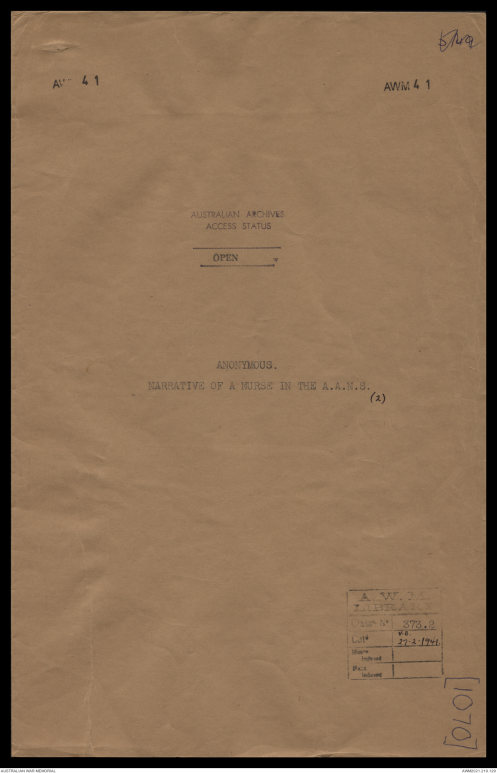
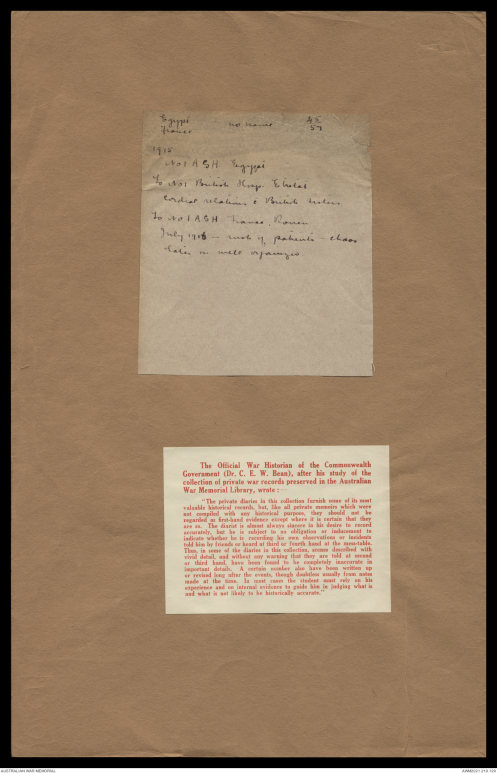
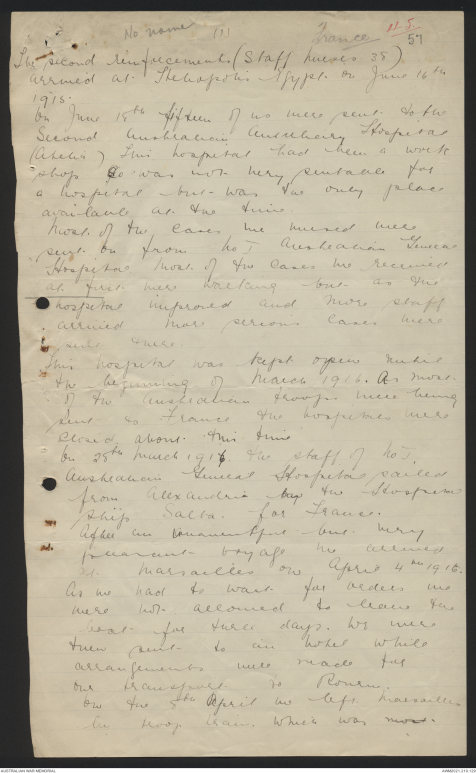
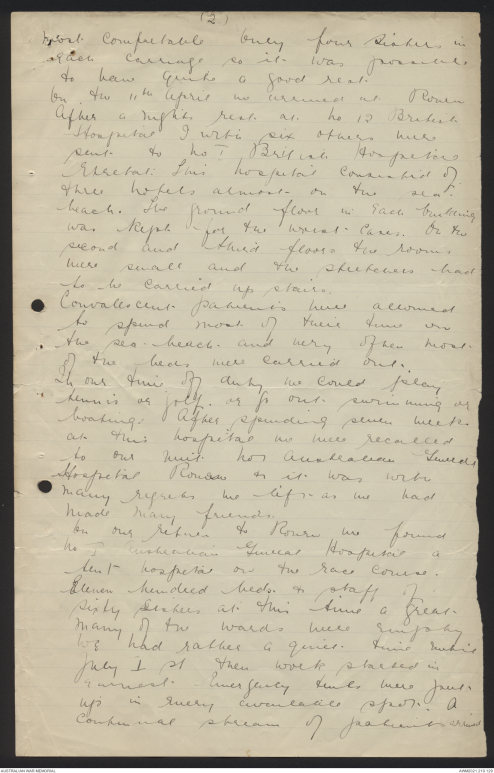
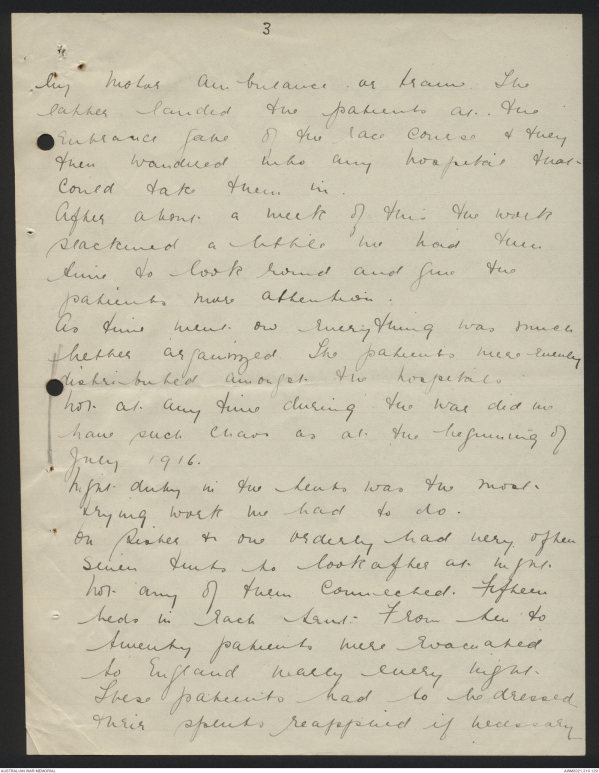
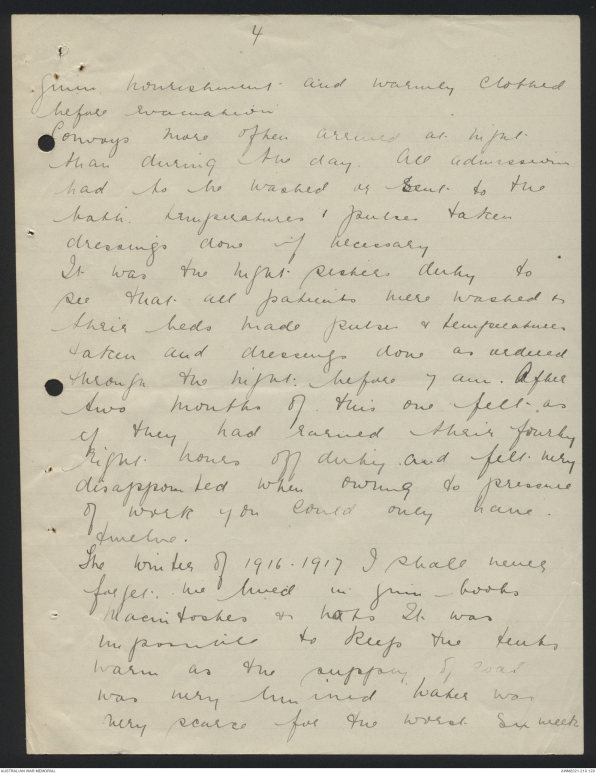
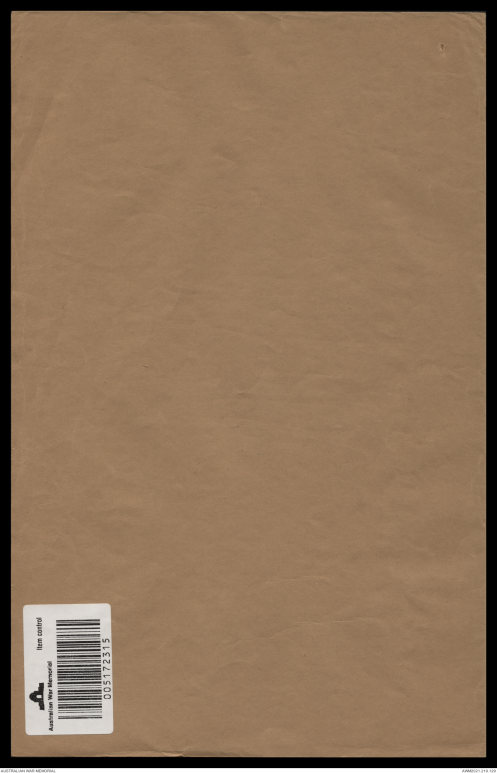
AW 41
5/49
AWM 41
AUSTRALIAN ARCHIVES
ACCESS STATUS
OPEN
ANONYMOUS
NARRATIVE OF A NURSE IN THE A.A.N.S. (2)
[*AWM
LIBRARY
Class No 373.2
Col NB 27.2.1941
[1070]*]
45
57
No Name
Egypt
France
1915
No 1 A.G.H. Egypt
To No 1 British Hosp Étretat
cordial relations & British Sisters
To No 1 A.G.H. France Rouen
July 1916 - rush of patients - chaos
later on will organize
[*The Official War Historian of the Commonwealth
Government (Dr. C.E.W. Bean) after his study of the
collection of private war records preserved in the Australian
War Memorial Library wrote :-
"The private diaries in this collection furnish some of its most
valuable historical records, but, like all private memories which were
not compiled with any historical purpose they should not be
regarded as first-hand evidence except where it is certain that they
are as. The diarist is almost always sincere in his desire to record
separately but he is subject to an obligation or inducement to
indicate whether he is recording his own observations or incidents
told him by friends or heard at third of fourth hand at the mess-table.
Then in sense of the diaries in this collection stories described with
vivid detail and without any warning that they are told at second
or third hand have been found to be completely inaccurate in
important details. A certain number also have been written up
or revised long after the events, though doubtless usually from [[a]]
made at the time. In most cases the student must rely on his
experience and on internal evidence to guide him in judging what is
and what is not likely to be historically accurate."*]
No name
(1)
France
45/57
The second reinforcements (Staff Nurses 38)
Arrived at Heliopolis Egypt on June 16th
1915.
On June 18th fifteen of us were sent to two
Second Australian Auxiliary Hospital
(Atelier) This hospital had been a work
shop so was not very suitable for
a hospital but - was the only place
available at the time
Most of the cases we nursed were
sent on from No 1 Australian General
Hospital Most of the cases we received
at first were walking but as the
hospital improved and more staff
arrived more serious cases were
sent there
This hospital was kept open until
the beginning of March 1916. As most
of the Australians though were being
sent to France the hospitals were
closed about this time.
On 25th March 19176 the staff of No 1
Australian General Hospital sailed
from Alexandria by the Hospital
ship Salta for France.
After an uneventful but very
pleasant voyage we arrived
at Marsailles on April 4th 1916.
As we had to wait for orders we
were not allowed to leave the
boat for three days. We were
then sent to an hotel while
arrangements were made for
our transfer to Rouen.
On the 5th April we left Marsailles
by troop train which was most
(2)
most comfortable Only four sisters in
each carriage so it was possible
to have quite a good rest.
On the 11th April we arrived at Rouen.
After a nights rest at the 12 British
Hospital I with six others were
sent to No 1 British Hospital
Etretat. This hospital consisted of
three hotels almost on the sea
beach. The ground floor in each building
was kept for the worst cases. On the
second and third floors two rooms
were small and the stretches had
to be carried up stairs.
Convalescent patients were allowed
to spend more of their time on
the sea beach and very often most
of the beds were carried out.
In our time off duty we could play
tennis or golf or go out swimming or
boating. After spending seven weeks
at this hospital we were recalled
to our unit No 1 Australian General
Hospital Rouen as it was with
many regrets we left as we had
made many friends.
On our return to Rouen we formed
No 3 Australian General Hospital a
tent hospital on the race course.
Eleven hundred beds & staff of
sixty Sisters at this time a great
many of the wards were empty
We had rather a quiet time until
July 1st then work started in
earnest. Emergency tents were put
up in every available spot. A
continual stream of patients arrived
3
by Motor Ambulance or train. The
latter landed two patients at the
entrance gate of the race course & they
then wandered into any hospital that
could take them in.
After about a week of this the work
slackened a little we had then
time to look round and give the
patients more attention.
As time went on everything was much
better organized. The patients were evenly
distributed amongst the hospitals
Not at any time during the war did we
have such chaos as at the beginning of
July 1916.
Night duty in two tents was the most
trying work we had to do.
One Sister & one orderly had very often
seven tents to look after at night.
Not any of them connected. Fifteen
beds in each tent. From two to
twenty patients were evacuated
to England nearly every night.
These patients had to be dressed
their splints reapplied if necessary
4
given nourishment and warmly clothed
before evacuation.
Convoys more often arrived at night
than during the day. All admissions
had to be washed or sent to the
bath temperatures & pulses taken
dressings done if necessary.
It was the night sisters duty to
see that all patients were washed &
their beds made pulse & temperature
taken and dressings done as ordered
through the night: before 7am. After
two months of this one felt as
if they had earned their fourty
eight hours off duty and felt very
disappointed when owing to pressure
of work you could only have
twelve.
The winter of 1916-1917 I shall never
forget We lived in gum boots
Macintoshes & hats It was
impossible to keep the tents
warm as the supply of coal
was very limited water was
very scarce for the worst six weeks
 Sam scott
Sam scottThis transcription item is now locked to you for editing. To release the lock either Save your changes or Cancel.
This lock will be automatically released after 60 minutes of inactivity.